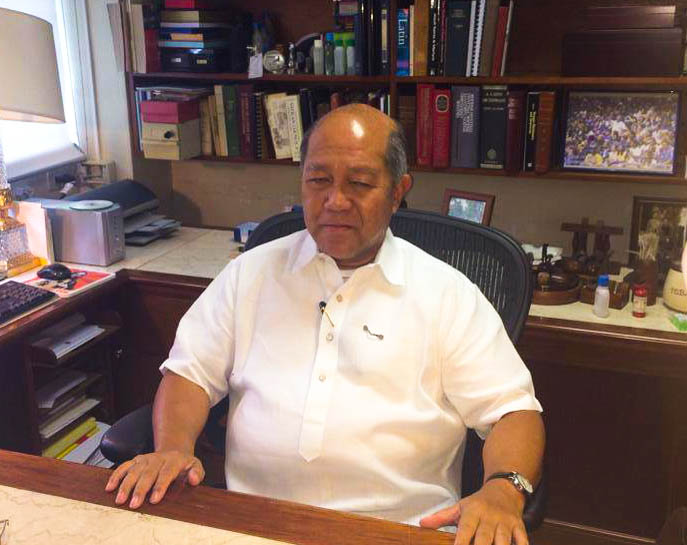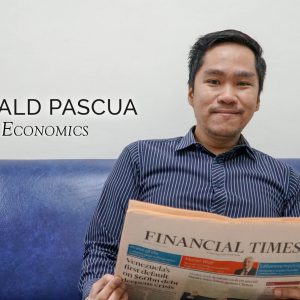Kimberly Pavon interviewed the legendary Fr. Adolfo Dacanay, SJ for Teachers’ Appreciation Week. Transcription by Isaac Cheung.
Kimberly Pavon (KP): When and why did you choose to be a teacher/professor?
Fr. Adolfo Dacanay, SJ (FD): Well, I started teaching in 1981 and taught until 1983, when I went off to study and resumed only in 1989. Why teaching? Because I was assigned as a Jesuit, but did they give me a choice? I suppose so. So why was I open to teaching? Because there are teaching genes in my body. My mother was a teacher, my siblings were teachers, and my father was a teacher and his siblings were teachers as well.
KP: What inspires you to continue teaching? Or what do you love most about teaching?
FD: What I hate the most is correcting papers! But those are necessary things that go with teaching, so you might ask why do I assign quizzes, papers, or exams in the first place. It comes with the territory; you cannot go there and just find out and just get the pros. What I like about teaching is, I hope, making a difference in a person’s life. Bringing Christ and the gospel and His teaching to younger people, I suppose when you see people go and mature, and in some cases, you even see people appreciating their faith more. I suppose I find joy in that. It’s like parents watching their child crawl and make the first step and that I suppose is my joy in life.
KP: What is the most memorable moment you’ve had in a classroom?
FD: I don’t know. I don’t know if there is any one specific memorable moment. I have to admit I never thought about it in those terms.
KP: What do you do when you aren’t teaching?
FD: Preparing for class (chuckles). Well, there other things outside teaching here in Ateneo. I teach church law to the students preparing for the priesthood. I read a little, I write a little. I told you I work in church courts. Besides writing, I like to read history or go and watch the basketball games. In the second semester, I watch the ladies and men’s volleyball teams.
KP: What are some valuable lessons you learned in being a teacher?
FD: For me, it’s important that things are also clear to you. I realize it’s easier to teach that. That’s why it’s important for me to think it, read it, or organize it. I think it’s a good way to prepare for class. I taught the first time when I was only 8 or 9 years older than the students, and I think there was some proximity there, but over the many years now, I have to think very consciously on what would make sense to the students or how and what would be important to them. I think those are things I feel I need to do also to be an effective teacher.
KP: What are some of your classroom pet peeves?
FD: Oh you know them! I think you can write a chapter of a book about that! I’m interested to find out what you think my classroom pet peeves are.
KP: What is the hardest aspect or part in teaching?
FD: I suppose the hardest part is immeasurable. That is to say, not only am I making sense—that can be measured in the grades, but, does it matter in their lives? I suppose that is always the question I have in mind. When I always say does it matter in their lives, will it change their lives? Will it affect their values? That is always what I would like to know because it’s not just something that occupies 3 hours of their Mondays-Wednesdays-Fridays, and an hour on Thursdays. In other words it is not just living. If it is just living I might have chosen the wrong profession. In more quiet moments, I suppose I like to ask myself if I am making sense to them, am I making a difference? Is Christ and the church being more real to them? Do they appreciate their faith? Those are the imponderables a theology teacher would be thinking about.
KP: Do you have any unforgettable student?
FD: There are many. I remember those who did well. I remember those who flunked. I remember those I have scolded, and I remember those I have sat out in class.
KP: What are some misconceptions about teaching?
FD: Well, one that is not a misconception is that it does not pay well (chuckles). But a misconception is that many students think that teachers are oppressing them when they demand. Sometimes you read your evaluation, “He’s a low grader,” or, “He is not practical or arbitrary in grading,” because students think that they say a couple of sentences with some technical words, I am supposed to give them an A. Eventually, you are doing just that, but the teacher is misleading the students that they are doing well, but as a matter of fact they are not doing well.
KP: Do you have any goals you have yet to pursue or dreams?
FD: I’m nearing the end of my life. I’m 62, and I’m planning to die at 70.
In 8 years, I suppose my goals are almost negative now. I suppose, I don’t want to be the cause of somebody jumping off a building.
KP: May you give a few parting words to the students you have taught and will teach.
FD: Well, of course, as a teacher, they think I have taught them well, but I could say I also have been taught and learned from the students. I can say those are life lessons.




